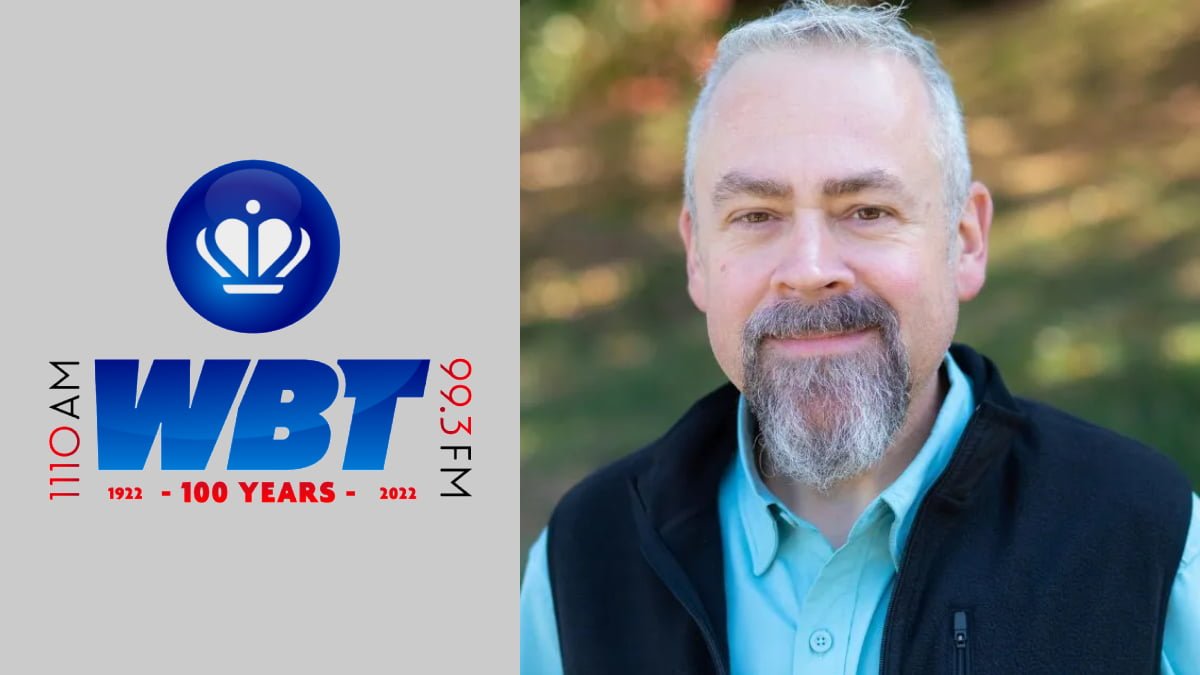When Pete Kaliner was a kid, there was a radio show on NPR that left a lasting impression. From this show, Kaliner learned a lot about current affairs around the world. His family might talk about some of those topics at the dinner table.
“My dad would commute to New York City. In the afternoon, we kids listened to an NPR show called Small Things Considered. It was a show produced entirely by kids,” Kaliner explained.
On the show, the kids did all the production including interviews and all the content.
“We loved listening to it. The show was later changed to Kids America. That’s the kind of stuff we listened to.”
Kaliner is the host of The Pete Kaliner Show from 12:00-3:00 PM ET on Charlotte news/talk station WBT. Kaliner said he would cut out current events clipping as a school assignment.
He went to West Islip high school on Long Island. “I worked on The Rudder, the student newspaper. West Islip is on the South Shore near Great South Bay. When I lived there people still fished for a living. Harvested clams out of the Bay.”
Kaliner says the area where he grew up has lost some of its identity through the years.
“I grew up in a suburb called West Islip, which resembles Levittown. A place where all houses look the same there. Mom is from Queens, Dad’s from the Bronx. They decided to move out to the sticks in 1972.”
He rarely went to Manhattan and had no real interest in spending time there.
“My dad worked in the city and I’d go with him once in a while to Queens. Pre-pandemic, we went to visit family in New York and spent a week there. We enjoyed that.”
Kaliner attended Winthrop University in South Carolina. He studied mass communication – broadcast. He minored in political science.
“They recruited me for my PSAT scores, and I got a break with in-state tuition,” Kaliner said. “My brother went to The Citadel. I got into a couple of other schools but couldn’t afford them. I stayed in SC after graduation and ended up in Charlotte.”
He likes Charlotte. Kaliner said it’s a mid-sized city pushing a million people. An area that has also experienced solid growth.
His father, while not a radio guy per se, may have missed a calling. The same calling his son followed.
“He’ll still send me some suggestions as to what to bring up on the air,” Kaliner jokes. “He tells me I should try this and that. He jokes about filling in for me, but he’s not really kidding. I had him on the show once and interviewed him. That interview was about his experience on 9/11. He worked across from the Trade Center.”
Kaliner started at WBT in 1999 as a part-time employee. He cut up audio in the newsroom.
“When Hurricane Floyd hit, I started interviewing people,” Kaliner said. “I interviewed my sister who lost everything. I packaged that story and it ended up on the air. I worked on Charlotte Hornets network broadcasts, compiling scores and news from around the NBA in segments during the pre-game, halftime, and post-game shows.”
When he started reporting full-time, Kaliner covered the county commission, state government, apartment fires, and plane crashes.
“I started filing 35-second stories for the top-of-the-hour newscasts,” Kaliner said. “In radio, we don’t have the luxury of a lot of time to tell stories during the newscasts. When I got a chance to host an hour-long show, I could do deeper dives.”
As most do in this industry, Kaliner was about to get axed from his job. He said he didn’t have a lot of knowledge about the contract side of the business. At one point, Carl East, WBT assistant program director at that time, told Kaliner they weren’t going to renew his contract.
“He told me I could walk away from the station, and said he wouldn’t blame me if I did,” Kaliner explained. “Then he offered another option. My contract didn’t expire until May, which was five weeks away. They must have trusted me to leave me on the air. I didn’t abuse their trust. I wasn’t about to burn my bridges and didn’t have a lot of options.
When an afternoon guy quit his job in Asheville, Kaliner filled in a couple of times and got the job. His wife kept the place in Charlotte and Kaliner would go home on the weekends. Kaliner spent nearly 10 years hosting an afternoon show on News Radio 570 WWNC in Asheville.
“I didn’t think the job would last as long as it did,” Kaliner said.
They sold the house in Charlotte and his wife, Christy, moved to Asheville. About four months later, in January 2020, he was let go by the iHeartRadio station.
So, he launched his own podcast a month later, just as the election season got started and the pandemic arrived. The plan was to offer the daily, hour-long show to stations around the state of North Carolina.
“State and local NC-based content has been my focus for 20 years,” he said. “I also began doing fill-in work at WBT in Charlotte during this time and then started hosting a weekend morning show. WBT also puts my podcast on Sunday mornings.”
Kaliner and his wife bought a house in Asheville and two days after closing he was offered a job at WBT.
The hire was part of the station’s commitment to keeping its lineup live and local.
“I’ll take a lot of calls on the show, discuss the news of the day,” Kaliner said. “I think if we all have discussions like we have, they will help solve world problems.”
A talk show host is always called upon to determine how he or she will behave on the air, and what persona they will carry into the show on a daily basis. Kaliner said somebody smarter than him once said anybody can do a show. But only one person can be Pete Kaliner.
“I don’t know how I can do anything other than The Pete Kaliner Show,” Kaliner explained. “I figured it’s good job security to name the show after myself as it would be harder to find someone else to do it,” he joked. “I was told a long time ago by now retired John Hancock, to just be myself and be honest. An audience will quickly sniff out a fake. So, that’s how I’ve always approached the role.”
If it’s possible, Kaliner thinks he does more prep for his show than necessary.
“In the morning, I’ll try to find topics I’m interested in,” Kaliner said of his prep. “That generally leads me to figure out what the audience is interested in on that day. I was once told by a PD that sometimes you want to take the easy layup. The easy topic everybody is talking about. Every single mass shooting calls for gun control. I don’t want to ignore it. If I don’t walk toward the fight, who else does?”
While still taking on contentious topics, Kaliner wants to be entertaining and informative.
“I try to arm people with arguments they can use. Prepare them for an argument, not just a disagreement.”
One of the perpetually contentious topics is Donald Trump.
“It’s gotten to the point where it’s difficult for people to avoid seeing life through the prism of Donald Trump,” Kaliner said. “Trump has broken so many people’s brains. He determines how millions of people are going to look at an issue. That’s both dangerous and damaging.”
Growing up in New York, Kaliner said he knew of Trump long before he ran for president. He’d heard the rumors, and read about the failings.
“I never thought he was qualified to be president,” Kaliner said. “At the same time, I don’t want to be arguing all the time with an audience. The ratings will tank, and I’ll be out of a job.”
He said a lot of people like the idea of Donald Trump, regardless of how insanely he manifests himself. Kaliner said in some ways his popularity was similar to Barack Obama’s.
“People rode each of them for what they hoped they’d be. People projected their own attributes and beliefs on the candidate.”

Jim Cryns writes features for Barrett News Media. He has spent time in radio as a reporter for WTMJ, and has served as an author and former writer for the Milwaukee Brewers. To touch base or pick up a copy of his new book: Talk To Me – Profiles on News Talkers and Media Leaders From Top 50 Markets, log on to Amazon or shoot Jim an email at jimcryns3_zhd@indeedemail.com.







